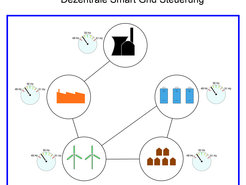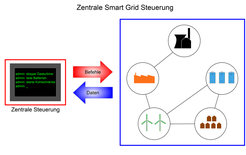A smart grid – self-organised simply
Electricity supply and demand can be coordinated in an entirely decentralised
way with the help of a new type of smart grid control.
To improve the management of fluctuations in the electricity supplied by solar and wind installations, the electricity network needs to work more intelligently in the future. Electricity suppliers aim to be able to regulate consumption on the basis of supply with the help of an intelligent electricity network, a smart grid. Intelligent electricity meters developed for such a system would be able to switch electrical devices on and off. Researchers from the Max Planck Institute for Dynamics and Self-Organization have now shown that intelligent electricity meters can match electricity demand and supply decentrally and on an entirely self-organised basis. Up to now, electricity suppliers worked on the assumption that they would need to collect consumption data centrally and also centrally coordinate electricity demand and supply. This makes the electricity supply vulnerable to hacker attacks and also raises data protection issues – problems that do not arise with a fully decentral solution of the Max Planck researchers. Decentral control also relaxes the need for the complex design of the vast communications infrastructure that would be required to connect millions of electricity meters with the major energy suppliers in future.

Decentrally organised electricity supply: According to a study carried out by researchers from the Max Planck Institute for Dynamics and Self-Organization, electricity control devices, so-called smart meters, can tailor the electricity supply from nuclear power plants and wind farms to the demand from industry and households based on a self-organised process. The study also takes into account whether the electricity is available in stored form, for example in batteries, or whether it has free storage capacity.


